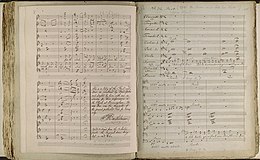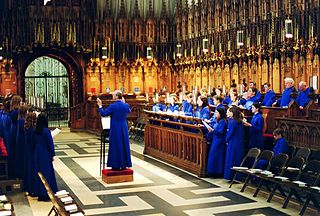
A choir, also known as a chorale or chorus is a musical ensemble of singers. Choral music, in turn, is the music written specifically for such an ensemble to perform or in other words is the music performed by the ensemble. Choirs may perform music from the classical music repertoire, which spans from the medieval era to the present, or popular music repertoire. Most choirs are led by a conductor, who leads the performances with arm, hand, and facial gestures.
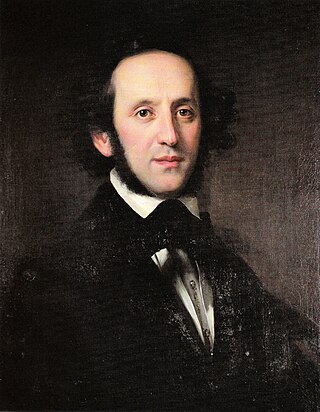
Jakob Ludwig Felix Mendelssohn Bartholdy, widely known as Felix Mendelssohn, was a German composer, pianist, organist and conductor of the early Romantic period. Mendelssohn's compositions include symphonies, concertos, piano music, organ music and chamber music. His best-known works include the overture and incidental music for A Midsummer Night's Dream, the Italian and Scottish Symphonies, the oratorios St. Paul and Elijah, the Hebrides Overture, the mature Violin Concerto, the String Octet, and the melody used in the Christmas carol "Hark! The Herald Angels Sing". Mendelssohn's Songs Without Words are his most famous solo piano compositions.
An oratorio is a musical composition with dramatic or narrative text for choir, soloists and orchestra or other ensemble.
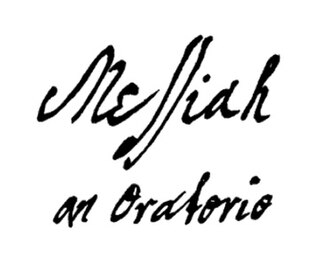
Messiah is an English-language oratorio composed in 1741 by George Frideric Handel. The text was compiled from the King James Bible and the Coverdale Psalter by Charles Jennens. It was first performed in Dublin on 13 April 1742 and received its London premiere a year later. After an initially modest public reception, the oratorio gained in popularity, eventually becoming one of the best-known and most frequently performed choral works in Western music.
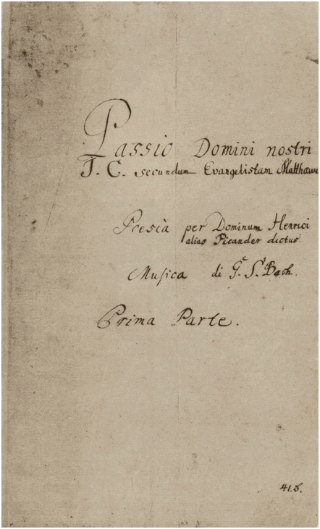
The St Matthew Passion, BWV 244, is a Passion, a sacred oratorio written by Johann Sebastian Bach in 1727 for solo voices, double choir and double orchestra, with libretto by Picander. It sets the 26th and 27th chapters of the Gospel of Matthew to music, with interspersed chorales and arias. It is widely regarded as one of the masterpieces of Baroque sacred music. The original Latin title Passio Domini nostri J.C. secundum Evangelistam Matthæum translates to "The Passion of our Lord Jesus Christ according to the Evangelist Matthew".

The Brockes Passion, or Der für die Sünde der Welt gemarterte und sterbende Jesus, is a German oratorio, libretto by Barthold Heinrich Brockes, first published in 1712 and seeing 30 or so more editions over the following 15 years.

The Prodigal Son is an oratorio by Arthur Sullivan with text taken from the parable of the same name in the Gospel of Luke. It features chorus with soprano, contralto, tenor and bass solos. It premiered in Worcester Cathedral on 10 September 1869 as part of the Three Choirs Festival.
Saint Peter's Singers (SPS) is a chamber choir associated with Leeds Minster, Leeds, West Yorkshire, England that celebrated during the Season 2017/2018 the fortieth anniversary of the choir's formation by Harry Fearnley in 1977. An anniversary concert took place at Leeds Minster on Sunday 25 June 2017 with the National Festival Orchestra and soloists Kristina James, Joanna Gamble, Paul Dutton and Quentin Brown. Further anniversary year events included Bach Cantatas and Music for Christmas at Fulneck Church in August and December respectively, Handel Coronation Anthems at Holy Trinity, Boar Lane as part of the Leeds Handel Festival in September and a tour of East Anglia in October. In November at Leeds Town Hall, the Singers participated in Herbert Howells's masterpiece Hymnus Paradisi with Leeds Philharmonic Chorus and Leeds College of Music Chorale under the direction of Dr David Hill with the Orchestra of Opera North. 2018 began with a concert of Sacred Choral Masterworks at Leeds Town Hall in February and Bach's Mass in B minor at Leeds Minster on Good Friday 2018 in memory of long-serving member Jan Holdstock. The final concert of the current season takes place at Leeds Minster on Sunday 24 June at Leeds Minster at 5.30. At this event will be presented the first performance of a new work from composer Philip Moore commissioned for the Singers' 40th anniversary – the motet Tu es Petrus – along with music by E W Naylor, Arvo Part, Sir Hubert Parry, Judith Bingham and Maurice Durufle.

The Light of the World is an oratorio composed in 1873 by Arthur Sullivan. Sullivan wrote the libretto with the assistance of George Grove, based on the New Testament. The work was inspired by William Holman Hunt's popular 1853–54 painting, The Light of the World. The story of the oratorio follows the whole life of Christ, told mostly in the first person, focusing on his deeds on Earth as preacher, healer and prophet.

Christus is title of an unfinished oratorio by Felix Mendelssohn, which exists only as a collection of fragments. The title was given to the work by the composer's brother, Paul, and it was published posthumously as Op. 97. Some scholars believe the completed movements may have been intended as parts of a larger, unrealised work.

Otto Moritz David Goldschmidt was a composer, conductor, pianist and educator, whose works included a piano concerto and other piano pieces, and an oratorio, Ruth, on a biblical theme, written for the Three Choirs Festival. From a prosperous mercantile family in Hamburg, he studied under Felix Mendelssohn at the Leipzig Conservatoire and quickly established himself as a pianist. Among the singers whom he accompanied was "the Swedish Nightingale", the soprano Jenny Lind. They married in 1852, after which she insisted on being billed as "Madame Lind-Goldschmidt".

Derby Choral Union is one of the UK’s longest standing choral societies having been formed in 1866. The choir was established to perform choral music of the highest quality, a tradition it strives to maintain to this day. The repertoire includes traditional choral works as well as music by 20th-century and more contemporary composers. Derby Choral Union is a registered charity and an independent choral society. It promotes concerts in Derby, England, and the surrounding district, and has over 100 active members.
Royal Melbourne Philharmonic (RMP) is a 120-voice choir and orchestra in Melbourne, Victoria, Australia. It was established in 1853, and is reportedly Australia's oldest surviving cultural organisation. The Royal Melbourne Philharmonic is Australia's oldest musical organisation that has been continuously existing for over 150 years. Among its programmes, there have been large-scale concerts celebrating classical composers including Bach, Mendelssohn and Beethoven. The Royal Melbourne Philharmonic is managed under the direction of Andrew Wailes, the artistic director of the orchestra.
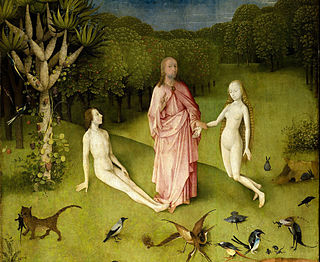
The Creation, the oratorio by Joseph Haydn, is structured in three parts. He composed it in 1796–1798 on German text as Die Schöpfung. The work is set for soloists, chorus and orchestra. Its movements are listed in tables for their form, voice, key, tempo marking, time signature and source.
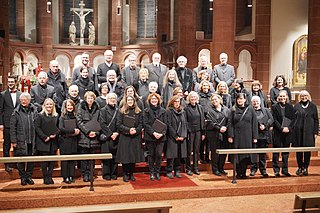
The Chor von St. Bonifatius is a German mixed choir, the church choir of the parish St. Bonifatius, Wiesbaden. It was founded in 1862 as a male choir and was a mixed choir from 1887. From 1981 to 2018, it was conducted by Gabriel Dessauer, who founded two children's choirs. The group sang the first performance in Germany of John Rutter's Mass of the Children and performed in Azkoitia, San Sebastián, Görlitz, Bruges, Macon and Rome. Colin Mawby composed for the choir the Missa solemnis Bonifatius-Messe for the 150th anniversary, celebrated on 3 October 2012. From 2019, the choir has been conducted by Roman Twardy who conducted in his first concert Dvořák's Stabat Mater. On 1 January 2022, Johannes Schröder became church musician. He conducted as his first choral concert Verdi's Requiem in an arrangement for small ensemble.

The Brockes Passion, or Der für die Sünde der Welt gemarterte und sterbende Jesus, is a German oratorio libretto by Barthold Heinrich Brockes, first published in 1712 and going through 30 or so editions in the next 15 years.
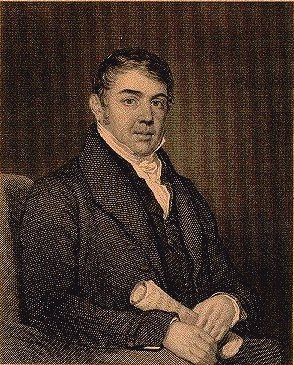
George Frederick Perry was a British violinist and organist, and composer of operas and oratorios. He was musical director of the Haymarket Theatre, and later was leader of the orchestra of the Sacred Harmonic Society.
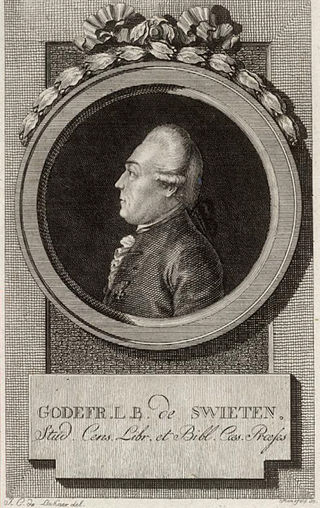
Der Messias, K. 572, is Wolfgang Amadeus Mozart's 1789 German-language version of Messiah, George Frideric Handel's 1741 oratorio. On the initiative of Gottfried van Swieten, Mozart adapted Handel's work for performances in Vienna.

Charles Lockey was an English singer. A tenor, he is known particularly as a soloist in the first performance of Mendelssohn's oratorio Elijah.

Vom Himmel hoch, MWV A 10, is a Christmas cantata by Felix Mendelssohn. He composed the chorale cantata, based on Luther's hymn "Vom Himmel hoch, da komm ich her", in 1831, setting selected stanzas with unchanged lyrics for soprano and baritone soloists, a five-part mixed choir (SSATB), and orchestra. The cantata was first published by Carus-Verlag in 1983, with an English version From heav'n on high.
